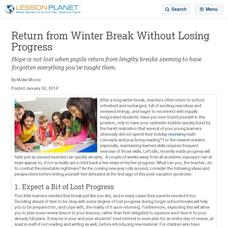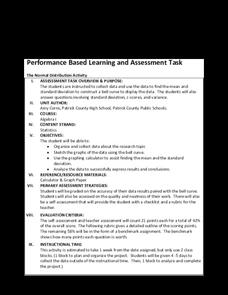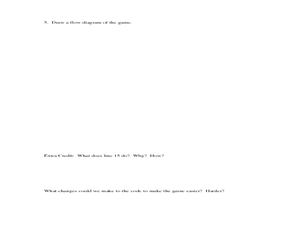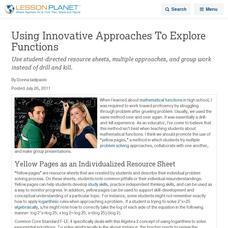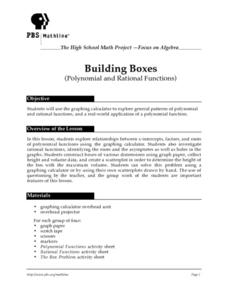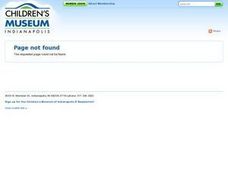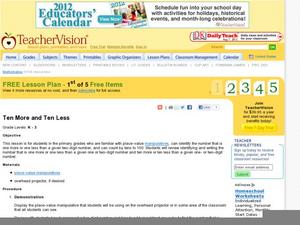Curated OER
Division of Decimals
Work with the class to investigate the concept of dividing decimals. They will use a variety of problem-solving skills in order to practice the operation of division. The teacher can use the dialogue to guide learners through the various...
Curated OER
Run for the Cup!
Students gather information about the Melbourne Cup horse race in Australia. Then they study the geometry and physics behind the design of a racetrack. Students also work in small groups to problem solve and design their own board games...
Curated OER
How Many?
Working with numbers 1-10, beginning counters complete five exercises to help them hone their skills. They examine two sets of sports balls, circling the ones at various number positions. Next, they count a set of ladybugs, recording the...
Curated OER
Return from Winter Break Without Losing Progress
Hope is not lost when pupils return from lengthy breaks seeming to have forgotten everything you’ve taught them.
PBS
Blow the Roof Off!
Blow the minds of young scientists with this collection of inquiry-based investigations. Based on a series of eight videos, these "hands-on, minds-on" science lessons engage young learners in exploring a wide range of topics...
Curriculum Corner
Camping Literacy Pack
Increase camping vocabulary just in time for summer with a camping themed literacy pack. Use word cards and sentence cards to enhance fluency, build vocabulary, and strengthen writing skills. The activities are perfect for centers,...
Radford University
Ping Pong Packing
Bounce off some ideas to reduce the amount of wasted space. Teams work together to determine the best size and shape of container to package a large order of ping pong balls. Groups are to design the container to reduce the amount of...
Radford University
The Wheels on the Bus
Find a cheaper way to keep buses going round and round. Small groups use their knowledge of ratios and proportions to find ways to save money on school transportation. The teams determine the number of miles buses currently travel by...
Radford University
Quadrilaterals
Connect the quadrilaterals. Working in teams, pupils use a variety of tasks to make connections between special quadrilaterals. With the properties well defined, the groups construct quadrilaterals based on those properties. Learners...
Radford University
The Normal Distribution Activity
For whom does the bell fit? Pupils begin by working in groups gather data on three different variables. They then determine the mean and standard deviation of each data set and create bell curves. To finish, they answer guiding questions...
Radford University
How to Calculate and Analyze the Equation for a Parabolic Path
Working in groups, pupils plot three points on the coordinate plane representing three different parabolic paths. Using a calculator, they determine the quadratic regression equation for their models. Each team then figures out the...
Radford University
Is it Really a Small World After All?
Working in groups, learners research four countries' populations over the past 30 years. Using the data collected, the teams find regression equations that best fit the data. Taking the regression equations, they then make predictions...
Curated OER
Numbers at Work
In this activity, students will research what kinds of math skills are used in their community.
Curated OER
TI Math, Games
Students solve problems using technology. In this algebra lesson, students apply flow diagrams and computer codes to solve problems. They use the TI to view the graphs.
Curated OER
Using Innovative Approaches To Explore Functions
Use student-directed resource sheets, multiple approaches, and group work instead of drill and kill.
Curated OER
Building Boxes- Polynimial And Rational Functions
Students investigate the concepts of polynomial and rational functions. They identify the general patterns used to solve problems. The use of real world contexts in the problems helps to promote engagement and understanding of how the...
Curated OER
Critical Thinking Strategies
Teach your readers to be critical thinkers. A strategy is outlined that can be used to compare and contrast entities. An example lists four states. The learner removes one state that "does not belong" in the list for some reason, and...
Curated OER
Can You Count on Cans?
How can a canned food drive be connected to math? It's as simple as counting and organizing the cans! Children demonstrate their ability to sort non-perishable foods into categories that include soup cans, vegetable cans, boxed items,...
Curated OER
Triangles Inscribed in a Circle
Are you tired of answers without understanding? Learners can give a correct response, but do they really understand the concept? Have young mathematicians think deeper about linear functions, angles, and formulas in algebra....
Math Salamanders Ltd.
Multiplication as Repeated Addition to 10x10
The class works to change 15 repeated addition problems into their multiplication counterparts and then completes 15 more where they do the opposite. This is a great way to build an understanding of what multiplication is and could...
Curated OER
Radiation Budget
Students solve the mathematical word problems by looking at the Earth's Energy Budget Diagram. They will work in small groups and then develop their own unique math problems from the diagram and share with the class.
Curated OER
What is an Animal Group?
Students discover that people live in groups and animals live in groups or alone. They list ways that families cooperate and work together as a group. They create a large dinosaur made out of geometric shapes.
Curated OER
Ten More and Ten Less
Get learners to analyze two-digit numbers based on place value, and use manipulatives to add and subtract both 1 and 10. A place value chart is available, and you can project it during guided practice. Through visualizing...
EngageNY
Arithmetic and Geometric Sequences
Arithmetic and geometric sequences are linear and geometric patterns. Help pupils understand the relationship and see the connection with an activity that asks them to write the rules and classify the patterns correctly. A sorting...





